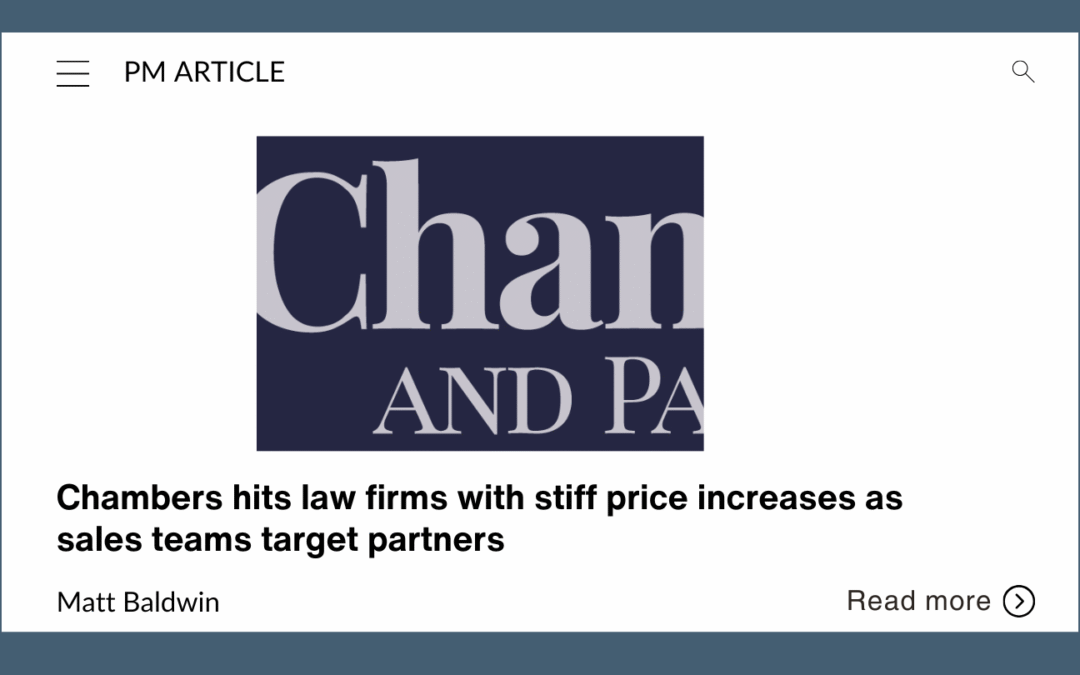Law firm marketers question the value of the legal directories following substantial price rises and aggressive sales tactics, writes Matt Baldwin.
Senior law firm marketers have reacted with frustration following substantial cost increases introduced by the private equity-owned Chambers directory for firms wishing to enhance their rankings.
Law firms report an average increase of 10% for paid enhancements to their Chambers profiles, with some firms facing increases of up to 20% and with one regional law firm pointing to a 49% increase since 2023.
Marketers report that these increases appear “arbitrary”, having “unequal pricing models” and “not based on any perceptible increase in value” and with “no improvement in client service”. Several large firms say they are now spending high tens of thousands, not including the lost billable hours and BD team time.
Purchased by US private equity firm Abry Partners for £400m in 2023, Chambers appears to have adopted a more aggressive sales approach, approaching partners directly, believing them to be “a soft touch”.
Several CMOs told PM that Chambers’ sales teams have widely ignored requests to make marketing and business development teams their primary point of contact.
“Chambers know marketing and BD teams are sceptical,” said one CMO, “and that is why they go directly to partners, despite those partners rarely being happy with their ranking.”
“Chambers think they can sell by the back door,” added a group CMO at a national firm, “believing that if partners agree, marketing will have to fall in line. They fail to understand that marketing is the budget holder.”
“It is an outdated, disrespectful sales technique which belongs in a car showroom and not in the professional services market,” the group CMO added.
Marketers acknowledge that whilst Chambers does not force firms to pay to enhance their profiles, one national firm that decided to no longer pay found that “rankings weren’t as strong, despite [Chambers] saying that it does not have an impact”.
“The life of legal directories as a sector is seriously limited and the ever-upward price increases are indicative of private equity ‘making hay whilst the sun shines’,” said one CMO at a leading regional law firm.
Data over ROI
Whilst marketers perhaps expected the cost of engagement to increase, it is the lack of any demonstrable return that is perhaps the biggest frustration.
“Chambers is no longer interested in rankings,” a former CMO at a global firm said. “It is only interested in scraping as much data from firms as possible.”
“The most alarming aspect is that firms willingly hand over the details of their deals and cases, and the directories package it up and sell it back to them,” added a former CMO at a global firm, adding that law firms then “do their marketing for them by promoting the wins. It’s quite a racket.”
Chambers appears also to have adopted a multi-jurisdictional approach, meaning its relevance to law firms operating solely or predominantly in the UK is minimal, said one marketing director of a UK firm. “With too much focus on ‘foreign desks’ and an international focus, it is not something we now find relevant.”
“If we were getting any form of ROI, even just web traffic, then maybe we would value these products,” said one CMO at a leading international law firm. “But this is purely a partner ego-feeding, data-grabbing exercise whilst private equity scrapes a huge return from it. The directories are the biggest drain on time and money.”
Another told PM that she has “zero ROI from the directories”, adding that her team “tracks sources of business and directories are never quoted as a source”. Chambers and Legal 500 sell “based on fear and ego of lawyers of not being included. They cause lots of extra work for firms at the busiest times of year, change schedules and submission requirements with limited notice and try to pass it off as benefiting firms”.
Despite the deep frustrations, marketers struggle to push back and withdraw from the legal directories.
“The directories are not stupid,” said a marketing leader. “They know law firms are partner-led democracies,” and that “most decisions are taken because of an inability to decide on what not to do.”
“It is easier to continue to spend five or even six figures with the legal directories than having difficult conversations with hundreds of partners who are hell-bent on their annual directories’ LinkedIn posts,” added a further marketing leader.
For all their criticism, several marketers did point to Chambers (and Legal 500) as a trusted source for AI search.
“As AI increasingly supplements traditional search methods such as Google, when I ask it for lawyer recommendations by region or speciality, it often draws on data from legal directory rankings,” said a UK marketer for a US law firm. “That can increase the marketing value of directories, although the effect will vary by audience and practice area.”
Another recognised that it is a “crude” health check of where a firm sits in the market, adding that “Chambers Unpublished (previously Chambers Confidential) does offer some value, although no substitute for a client listening programme.”
However, the technology developments Chambers promotes as part of its enhanced services “either do not work or are so basic they are next to useless,” concludes a marketing director at a leading regional firm.
“The early access to results sponsorship brings limited value.”
The Chambers directory was first published in 1990 at a time when legal marketing was in its infancy. Today, marketing and business development are sophisticated management functions with the ear of their partners and boards. For Chambers and Legal 500 to continue to thrive, it is essential that they have a meaningful relationship with the legal marketing community. And that means more than chasing cash.
All marketers contributing to this article requested their comments be anonymised.



